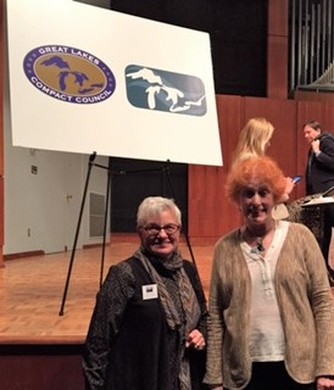"If Waukesha's application were approved in its present state, it would set a terrible precedent for the entire Great Lakes region and weaken the Compact!"  Marjorie Palleon and Claire Vanderslice at the Hearing. Marjorie Palleon and Claire Vanderslice at the Hearing. On Thursday, February 18, 2016, the Carroll University Shattuck Music Center, Room 122, was filled with hundreds of people interested and concerned about the first Great Lakes water diversion application. Busloads of people arrived from all over Wisconsin, Illinois, Michigan, Indiana, and even New York. Most were eager to state why they did not want this diversion to happen. We arrived early to sign up to speak and observe the area. The stage was filled with 12 chairs for the Governors and Premiers or their representatives. A microphone stood ready in the center floor walkway for public hearing presenters. At 2 pm, officials from DNR and Waukesha were on stage with slide presentations. They also answered questions from the audience regarding the diversion, radium pollution and removal, wetlands, sewers, wells, conservation, alternate water sources, and more. Promptly at 3 pm, the chairperson of the Great Lakes and St. Lawrence Governors and Premiers explained the public hearing rules to the audience. No one could speak unless they had signed in, and then been called by the chairperson. The organizers decided the order. First, all 20-30 officials from mayor, alderman, city planners, water and sewer planners and individuals of Waukesha appeared, the mayors of surrounding communities, and finally well know individuals from environmental organizations such as Elizabeth Wheeler, Todd Ambs, George Meyer of WI Wildlife Federation, Karen Hobbs of NRDC, ACLU and many more. It was then 6 pm and supper break was announced. There were 75 presenters left and the Governors and Premiers stated they would stay "until they were done." Many individuals left as the buses were leaving. We also left. Our statement had been received prior to the meeting by email, and we did not know if and when we would be called. Interesting information from the presentations:
Reported by Marjorie Palleon, LWV of Ozaukee Area and LWVLMR Delegate Comments are closed.
|
Archives
December 2017
Categories
All
|

 RSS Feed
RSS Feed